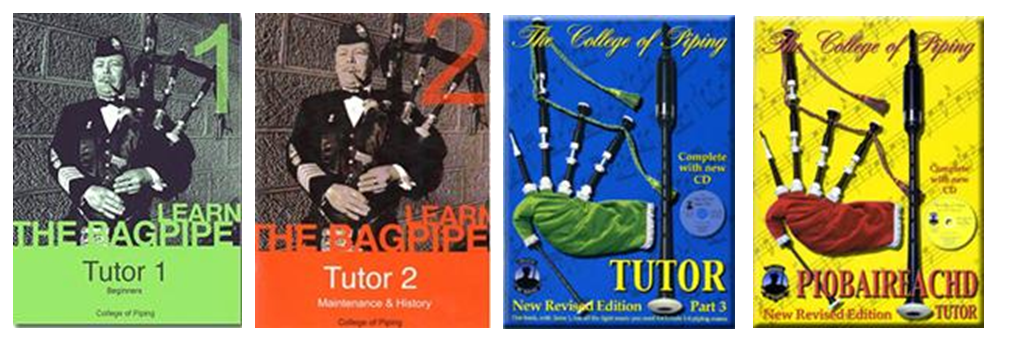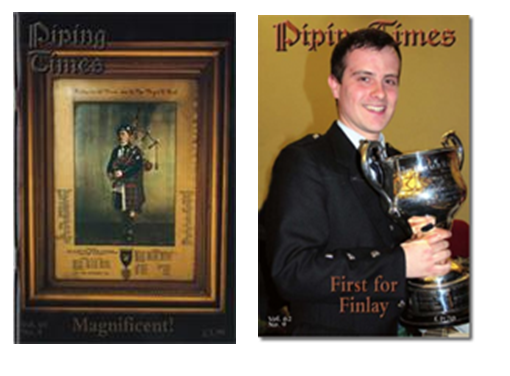| This Week’s Topic… | |

Best viewed in
|
College of Piping The College of Piping was founded in Glasgow, Scotland, in 1944 by Seamus MacNeill and Thomas Pearston to pass on the art of the Great Highland Bagpipe to all who wanted to learn Scotland's national instrument. As well as teaching, the College's aims were/are to preserve the heritage of the bagpipe by collecting piping artifacts, manuscripts and memorabilia and by providing a focal point for pipers the world over. College lessons are subsidized by profits from the College Shop which sells instruments, music, Highland wear and bagpipe accessories. A genuine charity, the College often teaches students of low means for free. The College of Piping runs two examination programs, the prestigious PDQB/SQA examinations, and the other in-house and based round the College’s own tutor books. There are also examinations which do not fall within the Scottish Qualifications Authority umbrella but which are approved and recognized by the PDQB.
The Piping and Drumming Qualifications Board (PDQB) is the certificating body for a range of qualifications offered jointly by The Army School of Bagpipe Music and Highland Drumming, The College of Piping, The National Piping Centre, The Piobaireachd Society and The Royal Scottish Pipe Band Association (RSPBA). Qualifications are currently available in Piping, in Pipe Band Drumming and in teaching these instruments. The development of a Pipe Band Studies qualification is presently in progress. Future plans may involve the development of Drum Major and Adjudicator qualifications.
The PDQB qualifications in Scottish Bagpipes and Scottish Pipe Band Drumming, which are validated and certificated jointly by the Scottish Qualifications Authority (SQA) and PDQB, are available nationally and internationally through 4 PDQB Examinations Centers.
The SQA is Scotland’s national awarding body, responsible for all Scottish qualifications within the national education system apart from university degrees and some professional body qualifications. The qualifications in Scottish Bagpipes and Scottish Pipe Band Drumming, which are certificated jointly by the SQA and PDQB, fall within a group of SQA qualifications known as National Progression Awards and Professional Development Awards. The National Progression Awards in Scottish Bagpipes and Scottish Pipe Band Drumming, and the higher level Professional Development Awards in Scottish Bagpipes are based directly on the Syllabi for the PDQB qualifications. All the awards have Levels and Credit Points within the SCQF. These Levels differ from the recognized Levels of the PDQB qualifications. SCQF Levels are a means of showing how qualifications relate to each other in terms of the amount of learning required. There are seven PDQB/SQA Piping certification levels:
PDQB Level 1 – Piping (Practice Chanter)
PDQB Level 2 – Piping (Practice Chanter)
PDQB Level 2 – Piping (Bagpipes)
PDQB Level 3 – Piping
PDQB Level 4 – Piping
PDQB Level 5 – Piping
PDQB Level 6 – Piping Since its founding in 1944, the College of Piping has always had its own system of piping examinations. These in-house exams run parallel with other exam systems in the piping and pipe band world offering a wider range of options to students. The CoP syllabus places the emphasis firmly on the student’s practical ability, therefore only the theory which is necessary for the correct understanding, interpretation and performance of the music is required.
There are eight CoP certificate grades . Additional certificates are available for teachers, tutors, performers and for Piobaireachd.
The College of Piping Tutor Book 1, by the then Joint Principals Seumas MacNeill and Thomas Pearston, was first issued in 1952, and is easily the biggest selling book on the bagpipe ever issued, selling to date (2011) 400,000 copies. It was extensively revised and updated by Robert Wallace when he became Principal in 1999, and from that date was issued with an accompanying CDRoM. This book is also available in Scottish Gaelic, French and German. In 2008 it became available in digital format and in 2011 available on iPad and iPhone. The College has issued three other tutor books, Tutors 2, 3 & 4. All have been re-written or revised by Robert Wallace following early work by Seumas MacNeill and Thomas Pearston. The College publishes many other collections of music all issued at the most affordable price possible in line with its charitable status.
Since 1948 the College of Piping has published the Piping Times monthly magazine, once described by Captain John MacLellan, former Director of the Army School of Piping at Edinburgh Castle, as the biggest single repository of bagpipe knowledge in the world. The magazine has a current worldwide readership estimated in 2011 at 10,000. That same year it became available on iPhone and iPad having previously been available in digital format since 2008. Seumas MacNeill was its editor from 1948 to 1996, being followed by Dugald MacNeill and since 1999 by Robert Wallace. The PT as it is affectionately known adheres to the highest standards of journalism and is often provocative and fearless in its criticism of what it sees as contrary to the interests of pipers and pipe bands. In 2005 it campaigned successfully to have the World Pipe Band Championships televised by the BBC and three years later fought to save one of the leading pipe bands in the country, the Strathclyde Police Pipe Band, from budget cuts imposed by a new Chief Constable. The College pioneered outreach teaching of the bagpipe when, in the early 1950s, Seumas MacNeill established schools of piping in North America. This undoubtedly led to an upsurge of interest in Scottish bagpiping on that continent and in no small way contributed to the high standard of piping in Canada and the United States currently enjoyed there. In 2007 the College established the first outreach teaching school on the European mainland when it launched its Winter School in Germany in association with the PiperscornerShop at Bruggen. This school has since relocated to Homburg in Saarland. The College has two annual schools in the US in California and New England in June and July each year. The College of Piping is a registered charity in the United Kingdom. |




